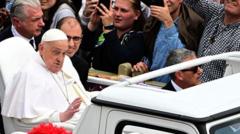Following the passing of Pope Francis, speculation arises over potential successors as church dynamics shift.
**Who Will Succeed Pope Francis? Analyzing Potential Papal Contenders**

**Who Will Succeed Pope Francis? Analyzing Potential Papal Contenders**
As discussions intensify regarding the next Pope, various candidates are emerging, reflecting differing visions for the Church's future.
In the wake of Pope Francis’s death at the age of 89, conversations about who will lead the Roman Catholic Church next have intensified. Historically, predictions surrounding papal elections have often proven inaccurate, as was the case when Francis was appointed in 2013, with few recognizing his candidacy as viable. Presently, observers face a more complex scenario; during his tenure, Francis appointed numerous cardinals, significantly diversifying the College of Cardinals and obscuring the traditional factions within.
Speculation about potential successors has been ongoing, with some names gaining traction early within Vatican circles. The upcoming choice could significantly influence the Church's direction, with possibilities ranging from progressive candidates who may continue Francis's legacy to those inclined towards a more traditional approach. Advisers suggest that the College may lean towards selecting a candidate with seasoned expertise in international relations, reflecting the modern Church's challenges.
One prominent contender is Pierbattista Pizzaballa. At 60 years old, the Italian cardinal currently oversees Middle Eastern affairs for the Vatican. His recent elevation to cardinal in 2023, coupled with extensive experience in a geopolitically charged region, positions him as a serious candidate for the papacy. Pizzaballa's insights and leadership in the Middle East, a site of ongoing conflict, could resonate well within the context of the Church's ongoing outreach efforts and crisis management.
Overall, as the papal conclave approaches, the world watches closely to see which direction the Roman Catholic Church will take and how its new leader will navigate the complexities of faith, tradition, and modernity.
Speculation about potential successors has been ongoing, with some names gaining traction early within Vatican circles. The upcoming choice could significantly influence the Church's direction, with possibilities ranging from progressive candidates who may continue Francis's legacy to those inclined towards a more traditional approach. Advisers suggest that the College may lean towards selecting a candidate with seasoned expertise in international relations, reflecting the modern Church's challenges.
One prominent contender is Pierbattista Pizzaballa. At 60 years old, the Italian cardinal currently oversees Middle Eastern affairs for the Vatican. His recent elevation to cardinal in 2023, coupled with extensive experience in a geopolitically charged region, positions him as a serious candidate for the papacy. Pizzaballa's insights and leadership in the Middle East, a site of ongoing conflict, could resonate well within the context of the Church's ongoing outreach efforts and crisis management.
Overall, as the papal conclave approaches, the world watches closely to see which direction the Roman Catholic Church will take and how its new leader will navigate the complexities of faith, tradition, and modernity.






















